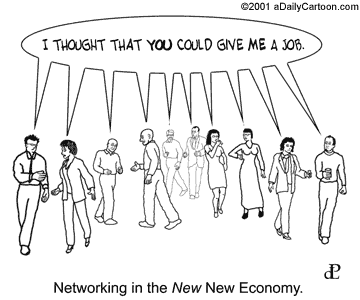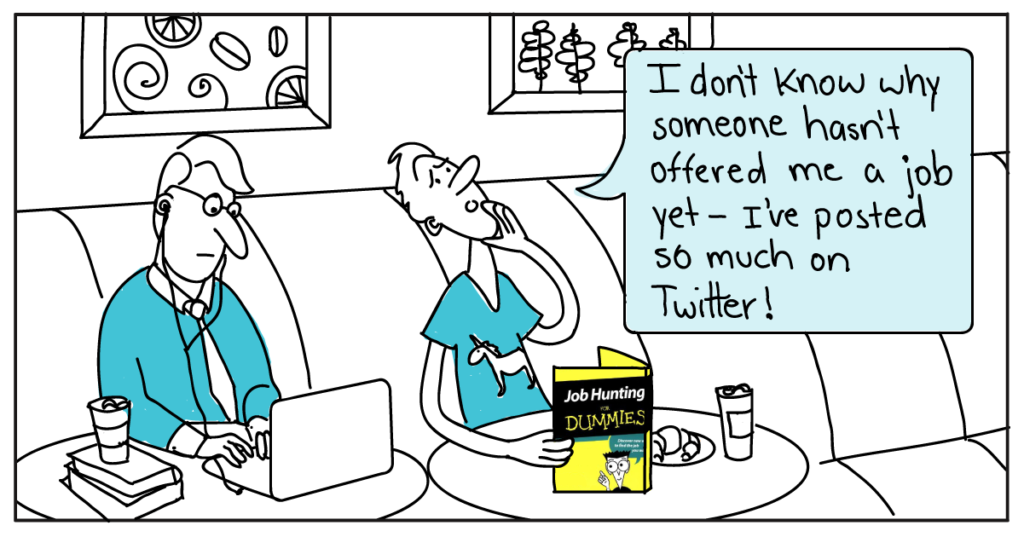GETTING JOB CONNECTIONS.
Networking is nothing more than getting to know people. Whether
you realize it or not, you’re already networking every day and everywhere you
go. You are networking when you strike up a conversation with the person next
to you in line, introduce yourself to other parents at your child’s school,
meet a friend of a friend, catch up with a former co-worker, or stop to chat
with your neighbor. Everyone you meet can help you move your job search
forward.
Networking is however most effective when you have specific
employer targets and career goals. It’s hard to get leads with a generic “Let
me know if you hear of anything” request. You may think that you’ll have better
job luck if you leave yourself open to all the possibilities, but the reality
is this “openness” creates a black hole that sucks all of the networking
potential out of the connection.
A
generic networking request for a job is worse than no request at all, because
you can lose that networking contact and opportunity. Asking for specific
information, leads, or an interview is much more focused and easier for the
networking source. If you’re having trouble focusing on your job search, you
can turn to close friends and family members for help, but avoid contacting
more distant people in your network until you’ve set clear goals.
Tapping the hidden
job market may take more planning and nerve than searching online, but it’s
much more effective. Adopting a networking lifestyle—a lifestyle of connecting
and helping others in good times and bad—will help you find the right job, make
valuable connections in your chosen field, and stay focused and motivated
during your job search.
Finding a job in today’s economy can be tough, but there are
opportunities if you know where to look. The best way to find these
opportunities is not through online job boards, the classifieds, or employment
agencies—it’s by talking to people around you. Your network of friends,
relatives, colleagues, and acquaintances is a valuable job search resource.
Networking may sound intimidating, but it can be rewarding and fun, even if
you’re shy or feel like you don’t know many people.
The vast majority of jobs openings are never advertised; they’re filled by word of mouth. That’s why networking is the best way to find a job. Unfortunately, many job seekers are hesitant to take advantage of networking because they’re afraid of being seen as pushy, annoying, or self-serving. But networking isn’t about using other people or aggressively promoting yourself—it’s about building relationships.
WHY NETWORKING MAY BE
THE EASIEST WAY TO GET A JOB
1. People do business primarily with people they know and like.
CVs and cover letters alone are often too impersonal to convince employers to
hire you.
2. Job listings tend to draw piles of applicants, which puts you
in intense competition with many others.
Networking makes you a recommended member of a much smaller pool.
3. The job you want may not be advertised at all. Networking leads
to information and job leads, often before a formal job description is created
or a job announced.
CREATING YOUR
NETWORK
Now getting connections is not really as difficult as it sounds,
we all have connections, we just may never know the true extent of it.
·
If you have friends, colleagues, family members and family
friends, then you do not know how blessed you are.
·
Each of these people you know may not be able to give you a direct
link to someone that can help you, but one of them definitely knows someone tat
can be of help.
·
Finally, each member of the possible network providers listed
above may even be able to connect you to people that can provide greater
networks than they can for you.
If you’re nervous about making contact—either because you’re
uncomfortable asking for favors or embarrassed about your employment
situation—try to keep the following things in mind:
·It feels good to help others. Most people will gladly assist you
if they can.
·People like to give advice and be recognized for their expertise.
·Almost everyone knows what it’s like to look for a job. They’ll
sympathize with your situation.
·Unemployment can be isolating and stressful. By connecting with
others, you’re sure to get some much needed encouragement, fellowship and moral
support.
·Reconnecting with the people in your network should be fun—even if
you have an agenda. The more this feels like a chore the more tedious and
anxiety-ridden it will be.
REACHING OUT TO
YOUR NETWORK
All
the connections in the world won’t help you find a job if no one knows about
your situation. Once you’ve drawn up your list, start making contact with the
people in your network. Let them know that you’re looking for a job. Be
specific about what kind of work you’re looking for and ask them if they have
any information or know anyone in a relevant field. Don’t assume that certain
people won’t be able to help. You may be surprised by who they know. When you
are looking for a job, start with your references. Your best references—the
people who like you and can endorse your abilities, track record, and
character—are major networking hubs.
·Contact each one of your references to network about your
possibilities and affirm their agreement to be your reference.
·Describe your goals and seek their assistance.
·Keep them informed on your job search progress.
·Prepare them for any calls from potential employers.
·Let them know what happened and thank them for their help
regardless of the outcome.
... to be cont'd



Comments
Post a Comment